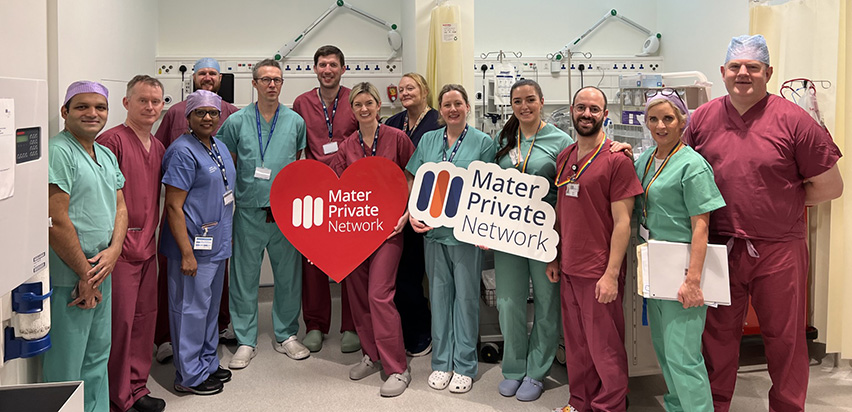16th September 2024
Cancer Care Team: Meet Monika Cisel-Michalczyk - CNM2 Prostate Liaison Nurse
Supporting professional growth and following one’s passion are key elements in achieving a fulfilling and impactful career.
Monika Cisel – Michalczyk is a Clinical Nurse Manager 2 (CNM2) Prostate Liaison Nurse at Mater Private Network in Dublin. Monika was born and raised in Poland, where she trained and worked as a theatre nurse. She joined our team in 2020 as a scrub nurse in our operating theatre and she quickly advanced to Clinical Nurse Manager 1, assisting with urological, general, colorectal and robotic procedures within the theatre. Monika also led staff education on robotic surgeries, a type of surgery not commonly performed in every hospital.
Although she found her role in the theatre to be an incredible opportunity to learn about various procedures, she yearned for more patient interaction. When a position for a CNM2 Prostate Liaison Nurse became available, she eagerly pursued it and began her new role in April 2024.
.jpg?sfvrsn=50179da8_1)
Can you please describe your role as a Prostate Liaison Nurse? When can patients expect to meet you?
Prostate Rapid Access Clinic
Part of my role as a Prostate Liaison Nurse involves working alongside the urology consultants in the Prostate Rapid Access Clinic. Patients who are referred to the clinic were found to have elevated Prostate-Specific Antigen (PSA), abnormal digital rectal exam, or family history of prostate or breast cancer. The BRCA1 and BRCA2 are genes that can increase a woman’s risk of developing breast cancer, and a man’s risk of developing prostate cancer. Therefore, having a family history of either cancer is considered a risk factor.
Elevated PSA does not automatically mean you have cancer. The goal of the clinic is to investigate each patient’s case and detect and treat cancer in its early stages.
Patients at the Prostate Rapid Access Clinic receive same-day review and access to diagnostic tests. Prior to their appointment, an MRI is carried to ensure the scans are available for the consultant to review when meeting with the patients. Upon arrival to their appointment, I carry out urine analysis to see if an infection is present in the urine. It is a simple dip stick test and if it comes back positive, I send the sample to our lab for further testing.
During their appointment with the consultant, the patient’s MRI, PSA and urine results are discussed, along with the patient’s medical and family history. The great thing about the service is that all patients are automatically booked in for a biopsy. It might be that they won’t need it once their case has been reviewed, but if they do, they can have it done the same day.
HealthCheck
HealthCheck aims to help people identify risk factors, signs and symptoms of common conditions. The service includes a Prostate Specific Antigen (PSA) test, which is recommended for men over the age of 40.
Learn more.jpg?sfvrsn=6c9862d8_0)
Prostate Cancer Surgery Pre-assessment
Patients receive their results within a few weeks of their appointment. If cancer is detected and surgery is scheduled, they will see me before and after the procedure. Since patients are already familiar with me from the Prostate Rapid Access Clinic, I think it puts them at ease to see a familiar face and helps me to build a strong relationship with them over time.
During pre-assessment, education is crucial. Patients learn what to expect at each stage, including surgery preparation, the day of surgery, and recovery. Post-surgery, patients often worry more about the catheter than the surgery itself. I educate them on how the catheter works to alleviate concerns about leakage or visibility.
Pre-assessment also includes education on pelvic floor (or Kegel) exercises to prevent urinary incontinence. Starting these exercises before surgery helps patients learn them correctly, as it can be challenging post-surgery
After surgery
The day after the surgery, I check on my patients to see how they are feeling and answer any questions they may have. Before they leave, I provide them with everything they need to recover at home, including practical things for their catheter and information leaflets. I also follow up once they return home, and they have my phone number for any queries during recovery.
What can we do to tackle any stigmas that may exist around talking about and addressing prostate cancer?
Discussing your cancer diagnosis is not an easy topic for anyone. However, from my experience as a urology nurse, I find that male patients diagnosed with prostate cancer may feel a sense of shame and embarrassment. Prostate cancer can be perceived as a threat to masculinity as it affects a gland that plays a crucial role in male reproductive and sexual function. Because of the location of the prostate gland, having surgery and further treatment can also feel like an invasion of privacy.
Patient education is key to addressing any stigmas around prostate cancer. Providing clear, comprehensive information about what happens at each stage of their treatment and after can help alleviate fears and misconceptions.
As a community, we should encourage the men in our lives to talk more regularly about prostate health. Normalising these conversations can reduce the sense of isolation and stigma that men might feel. Encouraging regular check-ups and open discussions about any concerns can lead to earlier detection and better outcomes.
Maintaining positive relationships with those around you can also help alleviate feelings of social or self-isolation. Family, friends, and loved ones can offer emotional support, practical help, and a sense of normalcy that can be incredibly beneficial during treatment and recovery.
.jpg?sfvrsn=248db68e_1)
In what way has your experience at Mater Private Network been different to working in Poland?
In Poland, I trained and worked in a large university hospital in Warsaw, covering nearly all specialties and treatments, including transplants and organ donations. The hospital had 21 operating theatres, each dedicated to a specialty. At Mater Private Network, our 9 theatres accommodate multiple specialties, requiring me to assist in a wide range of procedures. Although it was initially intimidating, this provided fantastic exposure and experience.
Another difference is that in Poland, my career as a scrub nurse felt quite fixed. Once you're in a role, especially a specialised one like scrub nursing, it's uncommon to transition to a different department or ward. The paths for career progression are more rigid, and there’s often limited flexibility if you want to explore other areas of nursing.
In contrast, at Mater Private Network, I've found much more freedom to shape my career according to my interests. When I realised that I wanted more direct interaction with patients and decided that I didn’t want to continue as a scrub nurse, I was able to pursue a different role that aligned with my new goals. The support for career development here has been incredible, allowing me to explore different facets of nursing and find a position where I truly feel fulfilled.
What do you enjoy the most about your role?
When I began my role as a Prostate Liaison Nurse, I truly found my passion. Although I loved my time as a theatre nurse, what I enjoy most is being able to build relationships with patients and assist them at every stage of their case. It is incredibly fulfilling when patients and their families tell you how much you have helped them. It is nice to hear you have done a good job by helping patients through a difficult time in their lives.










.jpg?sfvrsn=ee0f5b66_1)
.jpg?sfvrsn=ec7c101c_1)

